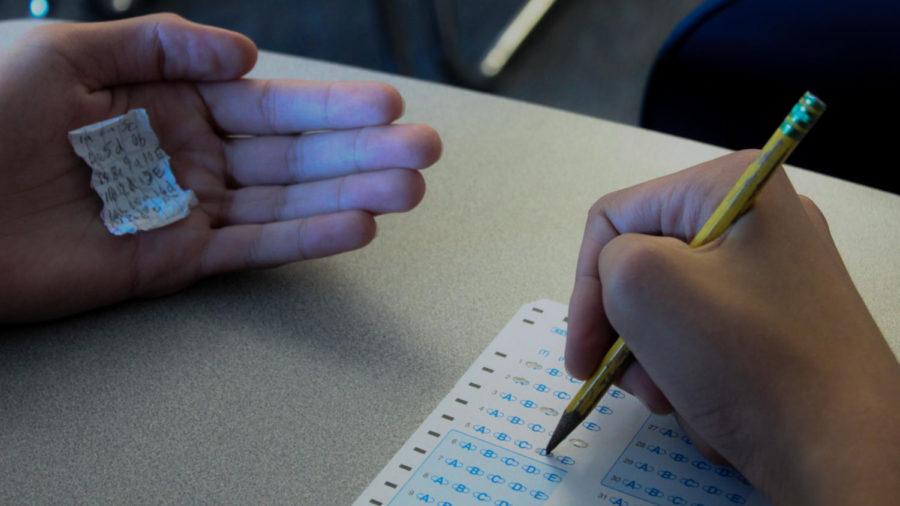Picture this: you have a math test in 20 minutes that you didn’t study for. As you frantically attempt to remember what the previous unit was about, you remember your friend took the test a couple of hours earlier.
Do you ask your friend for what the test is about, or do you tough it out and fail the test?
This moral dilemma is not uncommon in high school. According to a survey of 24,000 high school students conducted by professor Donald McCabe, 95 percent of students admit to some form of cheating.
“There are always people who just want to take the shortcut in life. That’s just how humans are wired,” Administrative Vice Principal Grant Steunenberg said.
The District Academic Integrity Policy defines academic cheating as “a form of academic dishonesty in which an individual undermines the integrity of an assignment or exam.” This includes copying an assignment or test from another student, using unauthorized resources during an assessment, and giving or receiving test information.
Steunenberg said, “If a student violates the academic integrity policy once, he or she gets a zero on the assignment and is required to meet with the vice principal. For subsequent violations, the student may be eligible for a state education code violation, meaning that it would show up on their college transcript.”
Despite this, students are continually finding new ways to cheat, and the invention of the cellphone has made cheating easier than ever.
“Students can pass around test answers to other students with the touch of a button,” Instructional Vice Principal Jennifer Cho said.
In an effort to reduce cheating, the Sequoia Union High School District implemented the Academic Integrity Policy three years ago; it created a unified code and a set of regulations for all teachers to follow.
Before this, the regulations and punishments for cheating varied from school to school; this policy attempted to unify the regulations through a universal code. Cho believes that its implementation was successful.
“I think we are at a pretty good point with our policy. If we were to enforce academic cheating any further, it would probably get in the way of curriculum,” Cho said.
Math Department Chair Robert Tsuchiyama teaches both Pre-Calculus Honors and Algebra 1. He said, “In my experience, the people who cheat are usually the higher achieving students who want to achieve certain grades but aren’t willing to work for it.”
Many have cited academic stress as a major cause of cheating. When students are behind on work, occasionally, they resort to cheating as a quick way out.
“Students feel like they need to be perfect nowadays. There’s nothing wrong with getting B’s, but students nowadays don’t believe that,” Tsuchiyama said. “I understand the pressure they’re under, but cheating is the wrong the way to relieve it.”
Wayne Smith*, a sophomore, was willing to sacrifice his integrity for straight A’s. In eighth grade, he used a cheat sheet to do better on a test. He does not regret what he did.
Smith said, “I felt that I needed to cheat on that test to get an A in that class, and I’d be willing to cheat again in a similar situation.”
However, the administration strongly discourages cheating. According to Steunenberg, the risks can be far more severe than the rewards.
“I know it’s a bit corny to say this, but when you cheat, you’re only cheating yourself,” Steunenberg said. “Too many times I’ve seen students who’ve cheated once have to cheat more and more times because they haven’t learned the curriculum,”
According to Tsuchiyama, there has been a shift in who cheats from lower level students to higher achieving students.
“The pressure on higher achieving students has increased tenfold in the past 15 years. When I was in high school, a lot of parents of people my age didn’t go to college, so we were kind of the first generation,” Tsuchiyama said. “Today, more kids’ parents have gone to good colleges, and now they expect their kids to go to a good college. They may not be as academically strong, but their parents won’t accept that.”
Sophomore Vincent Marley* was sick the day of a test, and one of his friends sent him a picture of one of the problems to solve at home.
“I don’t think I was completely wrong in doing this; I knew the material. I just wanted to make sure I got an A on the test,” said Marley. “A 4.0 [GPA] always looks better than a 3.8 [GPA] on your college transcript.”
Like many other students who cheat, Marley was never caught.
“I feel that for any given test, there is one to five students cheating on it, and while I don’t approve of it, sometimes it is a necessary action for students, like me, who have borderline grades,” Marley said.
According to the Journal of College and Character, academic cheating has grown because students are under pressure from an increasingly goal-driven society. With more competition, colleges have become harder to get into, and many students are willing to cheat to maintain a solid GPA.
“I really want to get into a good college like UCLA, and I don’t want one math class to define my entire life,” Smith said.
Smith believes that although it is partially the student’s fault, not all the blame should rest on them.
“Teenagers are under so much pressure from parents, teachers, and peers. You can’t expect them to act perfectly,” Smith said. “At some point, kids are going to break.”
Tsuchiyama said the problem of cheating will persist if students continue to value grades over their education.
“School is meant to help students learn, and when students cheat, they’re only hurting themselves,” Tsuchiyama said. “If one learns the material, the grades come with it.”
*Some sources requested to have their names changed in order to remain anonymous













John White • Sep 29, 2021 at 1:46 pm
Students cheat because they don’t respect the courses, the whole system. What we call “education”. If they respected the system, they wouldn’t cheat. Cheating is a message of no confidence to “educational” overlords. They never recognize this. They blame the students, never realizing it is they who are the problem.